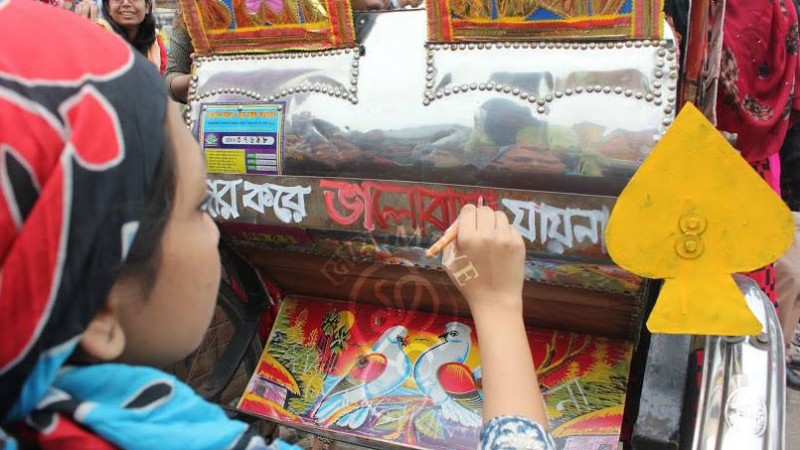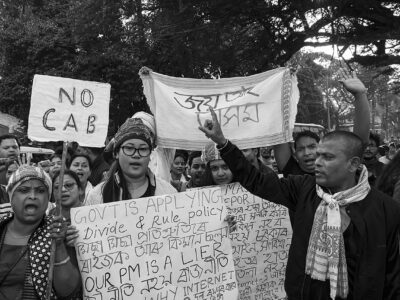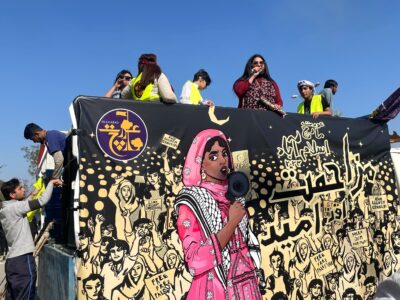
Posy misy hosodoko miaraka amin'ny hetsi-panoherana misy teny faneva avy amin'ny mpandray anjaran'ny hetsika “Rongbaji”. Sary: Sabrina Aman Reevy. Nahazoana alàlana
Malaza noho ny loko marevaka, voaloko mamirapiratra ivelany ny posiposy kodiaran-telo , iray amin'ireo famantarana ny renivohitr'i Bangladesh, Dhaka. Efa nampiasaina hatramin'ny taona 1940 ireo fiara ireo, ary ny Hosodoko izay mandravaka azy ireo dia afaka mampiseho ny zava-drehetra avy amin'ny mpilalao sarimihetsika malaza, avy amin'ny voninkazo na sary ara-pivavahana.
Tamin'ny fiandohan'ny volana Aprily, vondrom-behivavy efa ho 50 ao Bangladesh no nampiasa posy misy hosodoko ho toy ny fomba hanoherana ny herisetra atao amin'ny vehivavy sy ny fiatrehana ny tsy rariny. Nisy hetsika nokarakarain'ny Meye (midika ho “tovovavy” amin'ny teny Bangla ), tambajotra tsy hakana tombony, tarihin'ny vehivavy miteny bangla, izay manandratra ny zo, fanomezana vahana ary ny fitarihana ho an'ny vehivavy. Naorina tamin'ny 2011 ny vondrona Meye izay ahitana vehivavy tokony ho 5000 ao aminy, izay mifandray amin'ny alàlan'ny media sosialy amin'ny ankapobeny.
Tao anatin'ny taona vitsivitsy, mampiahiahy ny fitomboan'ny tranga fanolanana ao Bangladesh. Rehefa iharan'ny fanolanana ny vehivavy, dia matetika alàna baraka izy ireo ary anontaniana toy ny toherina ny fahamaotinany. Mahazatra ihany koa ny herisetra mahazo ny vehivavy eny an-dàlana. Maro hatramin'ny 87% amin'izao fotoana izao ny vehivavy manambady milaza fa miaina herisetra ataon'ny vadiny ao an-tranony, anisan'izany ny herisetra ara-tsaina, araka ny fanadihadiana tamin'ny 2011 nataon'ny governemanta ao Bangladesh .

Hafatra eo amin'ny farany ambany: বউয়ের দোয়া” (Bouer Doa – Vavaka ho an'ny vadiko), avy amin'ny hafatra mahazatra hita ao andamosin'ny posy – “মায়ের দোয়া” (Mayer Doa – Ny Vavaky ny reniko) – manamafy ny fandraisana anjaran'ny vady ao amin'ny fiarahamonina patriarika. sary: Navida Ameen Nizhu. Nahazoana alàlana.
Niresaka tamin'i Trishia Nashtaran , bilaogera sady mpanorina/mpandrindra ny Meye, hetsika fihavaozana, ny Global Voices.
Global Voices (GV): Afaka lazainao aminay ve ny momba ny hetsika hosodoko am-posy
Trishia Nashtaran (TN): None of us have forgotten the sexual assaults carried out against women on Pahela Baishakh (Bangla New Year celebrations) last year. Meye has responded to the violence then through ‘Arek Boishakh: A protest through celebration’ – urging women to once again reclaim the Dhaka University campus through colors, words and music.
This year, Meye welcomed the new year with a unique initiative they have named ‘Rongbaji’. Under the theme of ‘Let our words color rickshaws’, on the 1st of April, women voiced their protest through rickshaw paint at Nimtoli Gate, next to Bangladesh Asiatic Society. Before Bangla year 1423 arrives, the song in our hearts and the color in our souls took shape into words and images by adorning rickshaws — a transport that symbolizes the spirit of Dhaka. People of all gender were invited to lend a hand; because as we unite in celebration, we must also stand together when it’s time to protest an injustice.
Trishia Nashtaran (TN): Tsy misy taminay nanadino ny fanerena ara-nofo notanterahina tamin'ny alàlan'ny herisetra [mg] natao amin'ny vehivavy tamin'ny Pahela Baishakh (Fankalazana ny Taombaovao Bangla) tamin'ny taona lasa. Namaly ny herisetra i Meye ary avy eo tamin'ny alalan'ny ‘ Arek Boishakh: hetsi-panoherana ao anatin'ny fankalazana “- mampirisika ny vehivavy mba hamerina indray ny fitakiana ny fonenan'ny mpianatra Oniversite Dhaka amin'ny alalan'ny loko, teny ary mozika.
Tamin'ity taona ity, nandray ny taona vaovao tamin'ny hetsika tsy manam-paharoa izay nantsoina hoe ‘Rongbaji’ ny Meye. Eo ambanin'ny lohahevitra hoe ‘Andao handoko ny posy amin'ny tenintsika’, tamin'ny 1 Aprily, nanandratra ny feony tamin'ny alalan'ny posy misy hosodoko tao amin'ny vavahadin'ny Nimtoli, akaikin'ny Bangladesh Orinasa Aziatika ny hetsi-panoherana ny vehivavy. Talohan'ny nahatongavan'ny taona Bangla 1423, nandray endrika ho teny sy sary amin'ny alalan'ny firavahanan'ireo posiposy ny hira ao am-ponay sy ny loko eo amin'ny fanahinay – ny posiposy no fitaterana maneho ny fanahin'i Dhaka. Ny olona rehetra lahy sy ny vavy dia nasaina hifanome tànana; satria rehefa miray hina ao amin'ny fankalazana, dia tsy maintsy miara-mijoro koa rehefa tonga ny fotoana hanoherana ny tsy rariny.
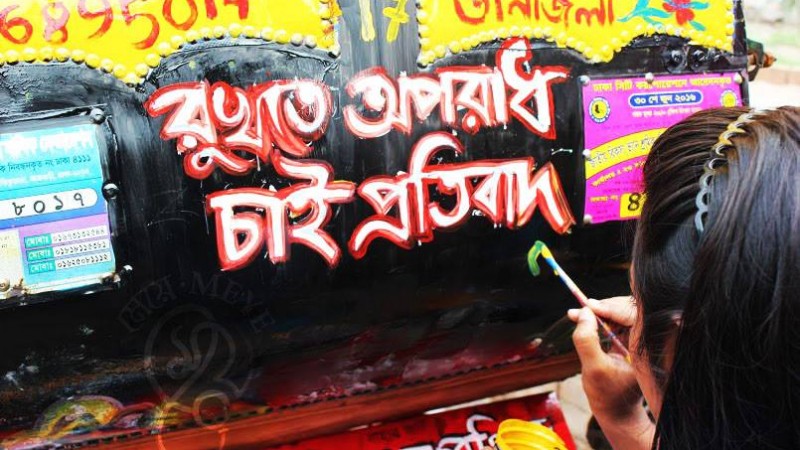
“Tsy maintsy mihetsika izahay hampitsaharana ny heloka bevava.” Sary: Navida Ameen Nizhu. Nahazoana alàlana
GV: Nahoana ianareo no nisafidy hosodoko amin'ny posiposy?
TN: Because, rickshaws are an integral component of our city lives. The images painted on rickshaws have always been a colorful reflection of the historical, cultural, social issues of our times.
TN: Satria,ny posiposy dia singa manana anjara amin'ny fiainan'ny tànantsika. Ny sary voaloko amin'ny posiposy hatramin'izay dia maneho ireo fieritreretana isan-karazany ara-tantara, ara-kolontsaina, ara-tsosialin'izao fotoana izao.

“নজর সামলে রাখুন” – “Hamarino ny fibanjinana maha-tohina”. Sary: Trishia Nashtaran. Nahazoana alàlana .
GV: Midika inona ny anaran'ny hetsika “Rongbaji”?
TN: The literal meaning of the word “Rongbaji” is playing with colors. In colloquial language, “rongbaj” is a word referred to spoilt brats who would stand on roadside and catcall women. The name was chosen for the rickshaw painting event for both the literal meaning and the colloquial one for the sarcastic tone it bears.
TN: Ny hevitry ny teny hoe “Rongbaji” ara-bakiteny dia milalao miaraka amin'ny loko. Amin'ny fiteny mahazatra, “rongbaj” dia teny ilazana zaza mihanta mijoro eo amoron-dalana ary misioka sy mikaoty vehivavy. Nofidiana ny anarana ho an'ny hetsika amin'ny sary hosodokon'ny posy na amin'ny heviny ara-bakiteny na amin'ny heviny mahazatra izay maneso izay entiny.
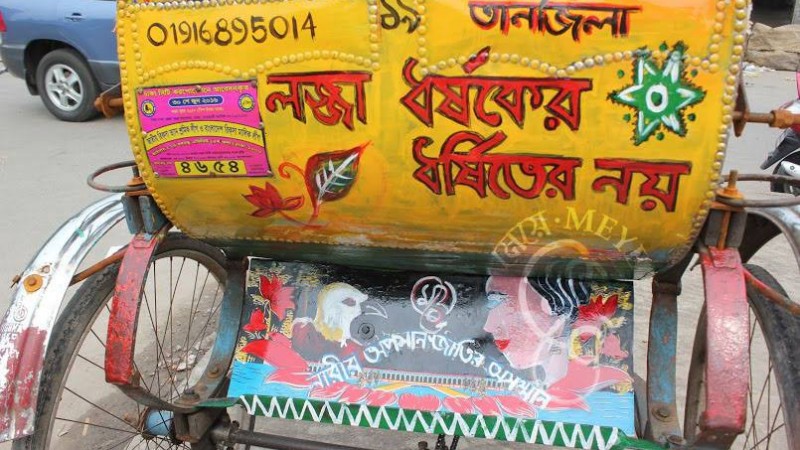
1) “ny henatra dia ho an'ny mpanolana fa tsy ho an'ny niharam-boina.” 2) “Raha manala baraka vehivavy ianao, dia manala baraka ny firenenao.” sary: Navida Ameen Nizhu. Nahazoana alàlana.
GV: Inona ny tanjona tianareo tratrarina
TN: We hope that the tradition of depicting messages of women in rickshaws we have started will be carried forward by the brilliant rickshaw painters (known in colloquial language as artist man) who help make our Dhaka rickshaws so very beautiful with their colorful strokes. Through the moving wheels of the rickshaws, our slogans will keep going forward and telling our stories throughout Dhaka. Some other organizations have already been planning to spread their protest in this way. We hope that words will thus roam around places and find their ways into people’s thought, leading us to a better tomorrow.
TN: Manantena izahay fa ny fomba mampiseho ny hafatry ny vehivavy eo amin'ny posiposy izay natombokay dia hotohizan'ny posy mpandoko mamirapiratra (fantatra amin'ny fiteny mahazatra hoe artista) izay manampy ny posiposin'i Dhaka ho tsara tarehy miaraka amin'ny soratra marevaka. Amin'ny alalan'ny kodiarana mihetsiky ny posiposy, dia handroso hatrany ary milaza ny tantaranay manerana an'i Dhaka ny teny fanevanay. Misy fikambanana hafa izay efa niomana ny hanaparitaka ny hetsi-panoherana toy izany koa. Manantena izahay fa hitety toerana maro ny teny, ary hahita ny làlany ho any anatin'ny fihevitry ny olona, ary mitarika antsika ho any amin'ny ampitso tsaratsara kokoa.

